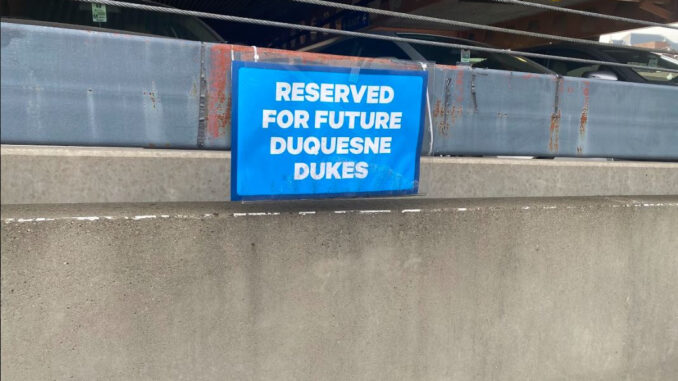
Zach Petroff | Opinions Editor
According to the Duquesne University Office of Institutional Research, there were 8,128 undergraduate and graduate students in the fall.
And there were just over 3,000 parking spaces on campus.
Next fall, the parking situation might look a little different.
Duquesne is proposing revoking the ability for on-campus first-year students to purchase a university parking pass. This policy would return freshmen parking privileges to the university’s pre-Covid rules. With this decision, Duquesne hopes to increase commuter parking and decrease traffic congestion.
As reported in the Duke on Dec. 1, Duquesne’s 2021-2031 Institutional Masterplan covers topics such as increasing multi-modal transportation options for students, faculty and staff in order to reduce use of single occupant vehicles (SOVs) for both employees and students.
The goal is to reduce employee SOV’s from 80.2% to 60%, while reducing student SOVs from 39.9% to 30%.
While the topic of freshmen parking passes was not discussed in the 150-page report, alternatives to SOVs who would not require the use of Duquesne’s on-campus parking were prioritized in the report such as a further implementation of the city’s public transit.
“The future implementation of the Bus Rapid Transit system will allow students to access new BRT stops on Forbes and Fifth to easily navigate between Duquesne, Downtown and Oakland for their retail shopping and entertainment needs,” the report read.
Parking has remained a major concern for the university in past years.
“The parking office maintains a running record of occupancy in order to operate the parking facilities on campus. Full occupancy is exceedingly rare,” said university spokesperson Gabriel Welsch.
“Those times when we anticipate heavy parking use, the university has means to address demand, including special remote work options for the day.”
In order to address demand, the university is considering the possibility of removing the ability of on-campus freshmen to purchase parking passes.
“The university is still exploring solutions regarding parking permits for first-year students living on campus; those first-year students who commute will be able to park, per existing policies,” Welsch said.
Timothy Lewis, director of commuter affairs, said in an email that during the fall semester, 4,761 students — 59% of the university’s total enrollment — were commuters. Of that number, 1,947 commuters were undergraduates, which accounts for 38% of the undergraduate population.
Students and staff seem to be eager to find any solution to alleviate parking issues going forward. The proposed initiative is being met with both skepticism and hope.
Lauren Zelnis, senior international relations student, commutes from her home 20 minutes from campus everyday.
“Is taking away parking passes really what needs revamped with the parking situation on campus?” she said.
The real issue, for Zelnis, is the cost of the parking pass.
“Just this semester was $825 for me. I don’t think it’s fair to not allow freshmen to have their cars on campus; I lived on campus but still had my car for my freshman and sophomore years, and it was vital to me.”
Abbey Wright, freshman in the nursing program, is a commuter student who thinks it is a bad idea to bump first year on campus students off the parking pass eligibility.
“They should just expand their parking,” Wright said. “Why pay for expensive housing when you live close?”
Kim Sudgan, a senior and international relations major, believes that a change in the current parking pass rules would be beneficial to her overall experience with parking on campus.
“If they remain restricted to remaining in the dorms, I think going back to the pre-covid ways of not allowing them to obtain parking passes should be enforced, with exceptions obviously,” Sudgan said. “I do feel it would help parking.”
Anna Rutkowski, a graduate assistant for the Office of Commuter Affairs, thinks there could be benefits to the proposal.
“I feel like [restricting the purchase of passes] could be a good thing for first-year resident students because it kind of forces them to get more involved,” Rutkowski said. “So they don’t just wake up, go to class, go to bed or leave school and do nothing, because by sophomore year you feel empty and unfulfilled.”
Rutkowski also mentioned safety as another reason the university should consider limiting passes to first-year, on-campus students, citing how “messy it has been on [the] South Side recently.”

